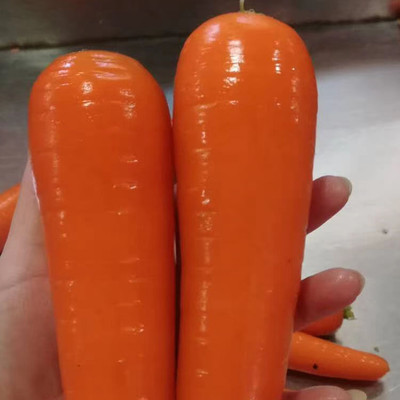ZIFR Orange Carrot Gajar Seed(500 per packet)
Quick Overview
Product Price Comparison
Specifications of Orange Carrot seedsCommon NameOrange CarrotSunlight45-85┬░FWaterminimum of 1 inch of water every weekTemperature50 and 85 degreesSoilloamy soil is requiredFertilizerCarrots require plenty of natural fertilizer rich in potassium.Germination6-20 DaysHarvest SeasonWinter Season Planting and care of carrotSowing of carrot seedsCarrots hate being transplanted, so it's better to sow them where they'll grow naturally. Remove all stones from the soil ŌĆō if a carrot root comes into contact with a stone, it will fork ŌĆō and rake the soil to a fine tilth. Make your seed rows now.Sprinkle thin pinches of the seeds along the row, then close the soil backup to cover the seeds.Since carrot seeds are so small, you can mix them with dry sand before sowing to help spread the seeds out throughout the row. When you're done, mark each row with the variety and date. To sow in grow bags, fill them halfway with potting soil and gently tamp them down to firm them up. Sow the seeds thinly on top, then cover with a quarter-inch (1cm) layer of potting soil. Water first, then mark.Growing carrot plantsMulch carrots gently to maintain moisture, hasten germination, and prevent direct sunlight from reaching the roots.When seedlings exceed an inch in height, thin them so that they stand 3 to 4 inches apart. To avoid damaging the delicate roots of the remaining plants, snip the tops with scissors rather than pulling them out.To begin, water at least one inch per week, increasing to two inches as the roots mature.Weed vigorously, but take care not to disturb the roots of the young carrots.Fertilize 5 to 6 weeks after sowing with a low-nitrogen but high-potassium and phosphate fertilizer. (It should be noted that excess nitrogen in the soil encourages top, or foliage, growth rather than root growth.)Harvesting carrotIn general, the smaller the carrot, the better its flavor.When the desired maturity or size is achieved, harvest. Carrots should be around the size of your palm, or at least 12 inches in diameter.If you grow carrots in the spring and early summer, harvest them before the daily temperatures reach a dangerously high level, as heat can cause carrot roots to become fibrous. Carrots taste even better after a frost or two. (A frost allows the plant to begin storing energy in the form of sugars in its root for later use.) Cover carrot tops with an 18-inch layer of shredded leaves after the first hard frost in the fall to keep them for later harvesting. Carrots are only available twice a year. If you don't harvest the carrots and leave them in the growbags, the tops will flower and bear seeds the following year.


